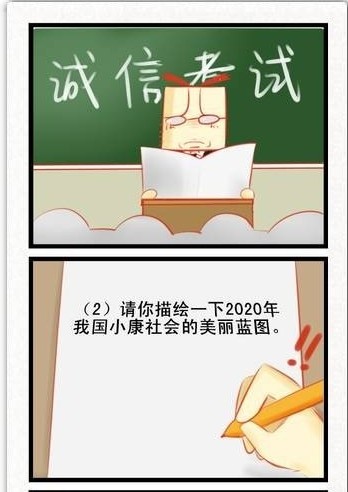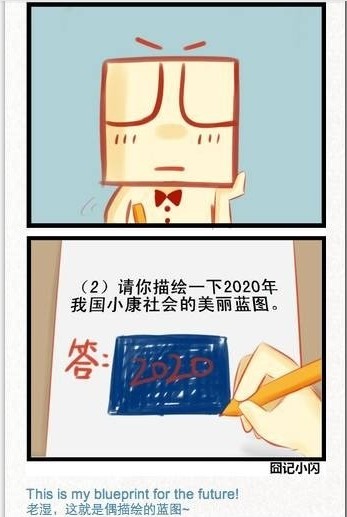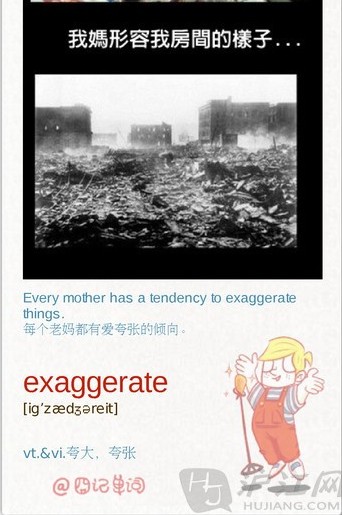|
-
— 本帖被 翦慕 从 English Corner 移动到本区(2014-04-13) —[ 此帖被微青。在2014-03-30 23:46重新编辑 ]
- 白钢杯妖2011-09-06+30 派派币
- 原创散文版九月主题活动基础分
- 乱舞殇女2011-09-06+7 派派币
- 原创内容=3=
- hellohalo2013-05-13+1 鲜花
- 赞一个先
- 乱舞殇女2011-09-06+7 派派币
- 原创内容=3=
- zy325932015-06-26+35 派派币
- 推荐补分
- zy325932015-06-26+15 派派币
- 6.26更新5本
- zy325932015-06-26+15 派派币
- 6.26更新5本
- 路小透。2015-06-18+4 读书值
- 读书值(含首发)奖励(字数基础分+质量补分超过25)
- 路小透。2015-06-18+4 读书值
- 读书值(含首发)奖励(字数基础分+质量补分超过25)
- zy325932015-06-18+4 鲜花
- 推荐奖励
- zy325932015-06-18+4 鲜花
- 推荐奖励
- zy325932015-06-18+110 派派币
- 推荐补分
- 倒序阅读 只看楼主
-
Week 10 Word 01
introduction [ˌɪntrəˈdʌkʃən] n. 介绍;引进;引言
introduction
1. 1. N-COUNT 可数名词引言;序言;导论 The introduction to a book or talk is the part that comes at the beginning and tells you what the rest of the book or talk is about.
例:Ellen Malos, in her introduction to 'The Politics of Housework', provides a summary of the debates.
埃伦·马洛斯在她为《家务政治学》一书所作的序言中对这些争论进行了总结。
2. N-COUNT 可数名词外来品;新引进的东西 You can refer to a new product as an introduction when it becomes available in a place for the first time.
例:There are two among their recent introductions that have greatly impressed me.
在他们最近引进的东西里面有两样给我留下了非常深刻的印象。[ 此帖被微青。在2014-03-30 22:25重新编辑 ] -
Week 10 Word 02
blueprint [ˈbluˌprɪnt] n. 蓝图,设计图,计划;vt. 制成蓝图,计划


blueprint
1. N-COUNT 可数名词蓝图;计划;设想;构想 A blueprint for something is a plan or set of proposals that shows how it is expected to work.
例:The country's president will offer delegates his blueprint for thecountry'sfuture
该国总统会向代表们展示他构想的国家未来发展的蓝图.
2.N-COUNT 可数名词(建筑、设计的)蓝图 A blueprint of an architect's building plans or a designer's pattern is a photographic print consisting of white lines on a blue background. Blueprints contain all of the information that is needed to build or make something.
例:The documents contain a blueprint for a nuclear device.
文件内附有一张核装置的设计蓝图。[ 此帖被微青。在2014-03-30 23:04重新编辑 ] -
Week 10 Word 03
bounce [baʊns] vi.反跳,弹起;跳起
bounce
1. V-ERG 及物/不及物动词(使)弹起;(使)反弹 When an object such as a ball bounces or when you bounce it, it moves upwards from a surface or away from it immediately after hitting it.
例:My father would burst into the kitchen bouncing a football.
我的父亲会颠着足球冲进厨房。
2. N-UNCOUNT 不可数名词 弹性,弹力 The bounce of a sports field is the condition of it, which determines how high a ball will bounce on it.
例:If I learned anything from these ads, it's that women bounce after using sanitary towels.
女人用了卫生巾之后就蹦蹦跳跳了,广告里都是这么说滴。[ 此帖被微青。在2014-03-30 22:58重新编辑 ] -
Week 10 Word 04
quiz [kwɪz] n.智力竞赛,问答比赛;小测验;vt. 考察,盘问
quiz
1. N-COUNT 可数名词问答竞赛;智力竞赛 A quiz is a game or competition in which someone tests your knowledge by asking you questions.
例:Flying rats and xiandan - what is this quiz really about?
老鼠和仙丹,这是神马谜语哦。
2. VERB 动词询问;查问;盘问 If you are quizzed by someone about something, they ask you questions about it.
例:He was quizzed about his income, debts and eligibility for state benefits...
他被问及收入、债务以及是否有资格享受政府发放的救济金等问题。[ 此帖被微青。在2014-03-30 22:41重新编辑 ] -
Week 10 Word 05
illiterate [ɪˈlɪtərɪt] n. 文盲;adj. 不识字的,没受教育的
illiterate
1. ADJ 形容词文盲的;不会读写的 Someone who is illiterate does not know how to read or write.
例:We call this story an illiterate tragedy.
这个故事叫做《一个文盲的悲哀》。
2. ADJ 形容词(音乐、科技、经济上)知之甚少的,接近无知的 If you describe someone as musically, technologically, or economically illiterate, you mean that they do not know much about music, technology, or economics.
例:Many senior managers are technologically illiterate.
许多高级经理都对技术知之甚少。[ 此帖被微青。在2014-03-30 22:44重新编辑 ] -
Week 10 Word 06
exaggerate [ɪgˈzædʒəreɪt] vt. &vi. 夸大,夸张


exaggerate
1. VERB 动词夸大;夸张 If you exaggerate, you indicate that something is, for example, worse or more important than it really is.
例:Every mother has a tendency to exaggerate things.
每个老妈都有爱夸张的倾向。
2. VERB 动词突出;夸大 If something exaggerates a situation, quality, or feature, it makes the situation, quality, or feature appear greater, more obvious, or more important than it really is.
例:These figures exaggerate the loss of competitiveness...
这些数字夸大了竞争力的丧失。[ 此帖被微青。在2014-03-30 23:02重新编辑 ] -
Week 10 Word 07
entanglement [ɪnˈtæŋɡlmənt] n. 纠缠
entanglement
1. N-COUNT 可数名词复杂关系(或情况);纠葛;瓜葛 An entanglement is a complicated or difficult relationship or situation.
例:I'm not going to even try to understand this logical entanglement.
这种逻辑纠结爷都懒得去搞懂。
2. N-VAR 可变名词纠缠;缠绕;缠住 If things become entangled, you can refer to this as entanglement .
例:Many dolphins are accidentally killed through entanglement with fishing equipment.
很多海豚因为被渔具缠住而意外死亡。[ 此帖被微青。在2014-03-30 22:50重新编辑 ] -
-
-
-
-
-
ID: Sadistic_
New Word(新单词): introduction, illiterate, blueprint, exaggerate, bounce
My Sentence(我的句子): The introduction of the illiterate about the blueprint of his house was pretty exaggerate but poorly described, fortunally, his annoying speech was interrupted
by the bounce of a ball that hit his head.
-
-



